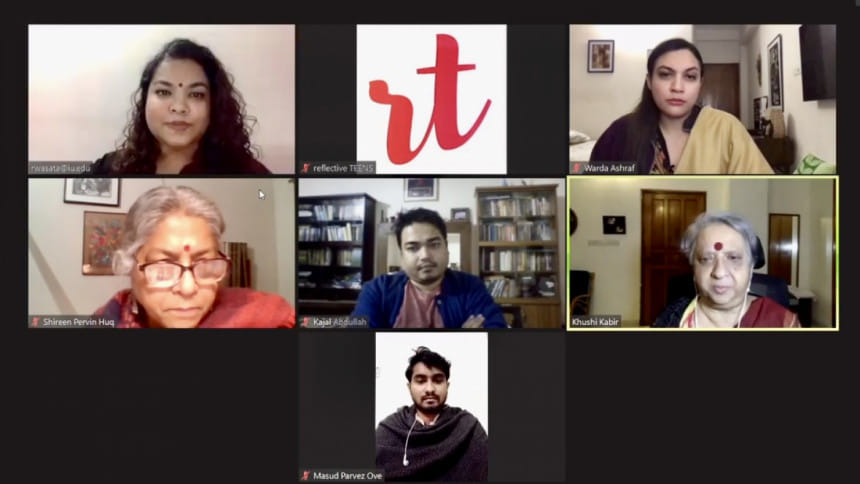Deconstructing myths about feminism

In an attempt to deconstruct the myths about feminism, a panel of leading gender activists, development practitioners, and professionals came together on December 26, 2020, on the platform, 'Reflective Teens', an internationally recognised nonprofit teen-based creative initiative that aims to foster the abilities of teenagers and prepare them for the present and the future.
The panel included Shireen Haq, Founder & Member, Naripokkho, Khushi Kabir, Coordinator, Nijera Kori, Samia Ahmed, Senior Manager, Advocacy and Campaign, Save the Children, Warda Ashraf, Development Practitioner and Cultural Activist, and Kajal Abdullah, Co-Founder and CEO, Jahaji Ltd. The session was moderated by Ruhun Wasata, Senior Lecturer, East West University and PhD student, Indiana University Bloomington, and hosted by Md. Masud Parvez Ove, Senior Teacher, South Point School and College, and Former Bangladesh Coordinator, South Asian Students for Liberty.
In the beginning, the panelists of the session aptly discussed the true definition of feminism. The ideology or notion which advocates for equality between men and women in political, societal and economic spheres is known as feminism. A common statement looms around us that we do not need another concept to incorporate and implement the simple idea of equality. Nonetheless, feminism was the first to address issues such as gender discrimination, economic disparity, inhumane violence, and under-representation of women in the political sphere.
The necessity of feminism lies in the fact that it provides a platform for women to make their voices heard. In this regard, Shireen Huq said, "Nothing ever changed in any society without anger and indomitable zeal". Moreover, equity among the male and female inhabitants of civil society is an undeniable element to ensure holistic development. The influence of feminism prevails from state machinery to the fundamental unit of any society.
Our society has a despicable tendency to tie a woman's worth only to her reproductive abilities and compliant nature. Promoted by patriarchy, this situation has been prevailing for hundreds of years. To bring positive change in our marginal communities, feminism has been a powerful tool. "We must start to question the patriarchal norms with an open mind. The more we strive to find answers, the more we will advance towards equality. That is the true goal of Feminism" shared Khushi Kabir.
The present scenario of our nation is quite unfavourable. As religious gatherings can address a large group of people, we must work together with our religious institutions to decrease the malevolent spread of religious intolerance. "At first, we should include imams and the madrasahs in our struggle and if they continue to feel ostracised from the mainstream society, hatred and intolerance surely will spread," shared Kajal Abdullah. "We should be the ones to communicate and share our ideologies with them". He also spoke about the importance of behavioural changes in our society.
Distinguished cultural activist Warda Ashraf proposed creating behavioural changes in our youngsters. She said, "Change starts from the most rudimentary stage of our lives. If we can educate a single person about the true message of feminism, it is also commendable".
Restricted mobility in our society also contributes to undermining women. "It is an inherent right of every human to be able to respect themselves. However, the unusual confluence of cultural appropriation and societal changes have exacerbated violence and ignorance among the population," said Samia Ahmed. The only way we can tackle this rising wave of cultural disintegration is by upholding our teachings of harmony and equality.
The lessons of feminism not only promote equality but also pave the way for a better life for both men and women. "Feminism frees a person from his or her toxic orthodox ideas and renders intellectual freedom," shared Khushi Kabir.

 For all latest news, follow The Daily Star's Google News channel.
For all latest news, follow The Daily Star's Google News channel. 




Comments